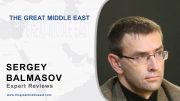A month ago, Iraq’s Kurds raised their hopes for independence after voting overwhelmingly to break away from Iraq in a referendum. Those dreams now appear shattered after Iraqi troops rolled into Kirkuk, tore down the Kurdish banner and raised Iraq’s national flag. The oil-rich city, claimed by the Kurds and Baghdad, was critical to the autonomous Kurdistan Regional Government’s ambitions for secession. Economically, Kirkuk’s oilfields were central to the Kurds’ dream of creating a viable Kurdish state. Emotionally, the ethnically mixed city has long been claimed by Kurdish officials as the heart of Kurdistan. But as Iraqi tanks rumbled into Kirkuk on Monday, cheered by the city’s Turkmen and Arab minorities which have bristled under three years of Kurdish rule, the most dangerous possible outcome of the referendum bid may have emerged.
Two regional forces, the Iraqi military and the Kurdish peshmerga, armed and trained by the US are now at loggerheads. With Arab-Kurdish tensions running high, there is the risk of escalating conflict between Iraqi and Kurdish forces which fought side by side in a campaign to clear the region of the last footholds of Isis. In Baghdad, all eyes are on Masoud Barzani, the Kurdistan regional president, and his ruling Kurdistan Democratic party, which has loudly condemned the Iraqi advances and for days warned of war. The party also claims that Iraqi Shia militias backed by Iran have been involved in the operation in Kirkuk. “Up to now, things are under control . . . but the next two days will be very dangerous. If the KDP chooses to escalate, this will really worsen,” an Iraqi official in Baghdad said.

Pictures on social media showed Kurdish children fleeing the city along with convoys of cars that jammed the highways. In others, Iraqi fighters smiled as they posed with dead peshmerga fighters. “There is a huge rupture happening,” the Iraqi official added. “But it is not just between Baghdad and the Kurds.” Indeed, the crisis has exposed dangerous divisions among the Kurds, as leaders from the top rival factions in the KRG accuse each other of treason and treachery for the loss of the city. The Iraqi advance was facilitated by the withdrawal of Patriotic Union of Kurdistan, the KRG’s second-largest component, in a reminder of a decades-long power struggle. The two parties have a history of betraying each other, most infamously in 1996 when Mr Barzani invited Saddam Hussein’s troops to fight the PUK. To this day, the loyalties of peshmerga forces are split between the PUK and the KDP. Mr Barzani’s critics say his insistence on pushing for a referendum, particularly in Kirkuk, put the Kurds in a difficult position. The vote was strongly opposed by Baghdad, the US and Iraq’s neighbours. Turkey and Iran have since banded together with Baghdad to try to punish the KRG, fearing the referendum could inspire their own Kurdish populations to push for greater autonomy. The US has been unwilling to step in even though two of its main regional allies are dangerously at odds. “We don’t like the fact that they’re clashing, but we’re not taking sides,” US president Donald Trump said on Monday. The KRG gained full control of Kirkuk in 2014 when Iraqi forces melted away after Isis swept through the north of the country. The peshmerga used the opportunity to enter the city and seize its military base, airport and oilfields.
All of those gains have now been lost to Iraqi forces after PUK-led peshmerga fighters withdrew. Some oilfields appear to remain in peshmerga control — and the decision of whether to fight for them could determine how violent the conflict becomes. A Kirkuk resident said the situation had calmed by late on Monday. “There seems to be good co-operation between the forces that came from Baghdad and the PUK-linked security forces in the city,” he said. “I don’t think there will be an escalation. Yet for Kurdish ambitions, the cost is already high. “The Kurds have lost Kirkuk for ever,” said Dana Nawzar Jaf at Durham University. “We are not just back to pre-2014 positions, we’re heading back to the pre-2003 border,” he said, referring to the US-led invasion that toppled Saddam, the Iraqi dictator, and allowed Kurds to legitimise their autonomy. Tensions could be restrained, however, by Baghdad and Erbil’s shared interest in keeping oil flowing, giving the KRG a degree of leverage in any negotiations with the federal government. All oil production from the north of the country flows through a pipeline controlled by the KRG to Turkey’s Mediterranean port of Ceyhan. Baghdad’s own export pipeline through the north was destroyed by militants in 2014. Oil industry analysts predict that it could take months if not years for Baghdad to put its own pipeline back together. That leaves it reliant, for now, on the KRG to get much-needed export revenues from what they can produce from their fields. Richard Mallinson, a geopolitical analyst at Energy Aspects in London, said: “Baghdad and Erbil have been grudgingly dependent on one another as the Kurds control the only working export pipeline serving northern Iraq.”
Source www.ft.com



Be the first to comment at "Kurds’ independence dreams shattered by Iraqi tanks in Kirkuk"